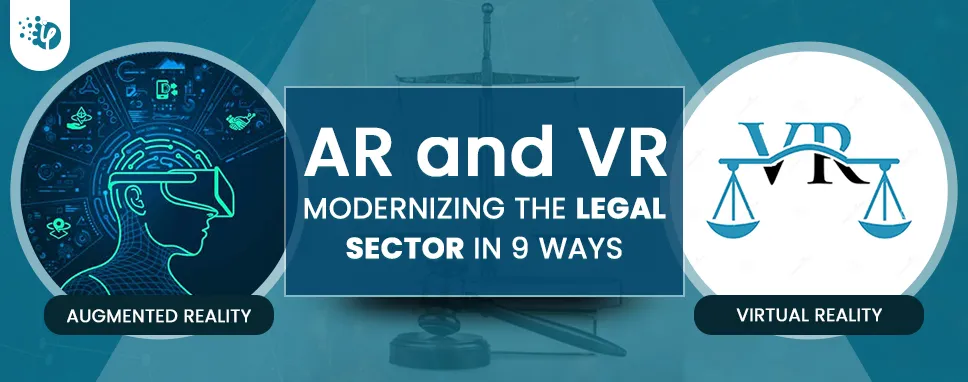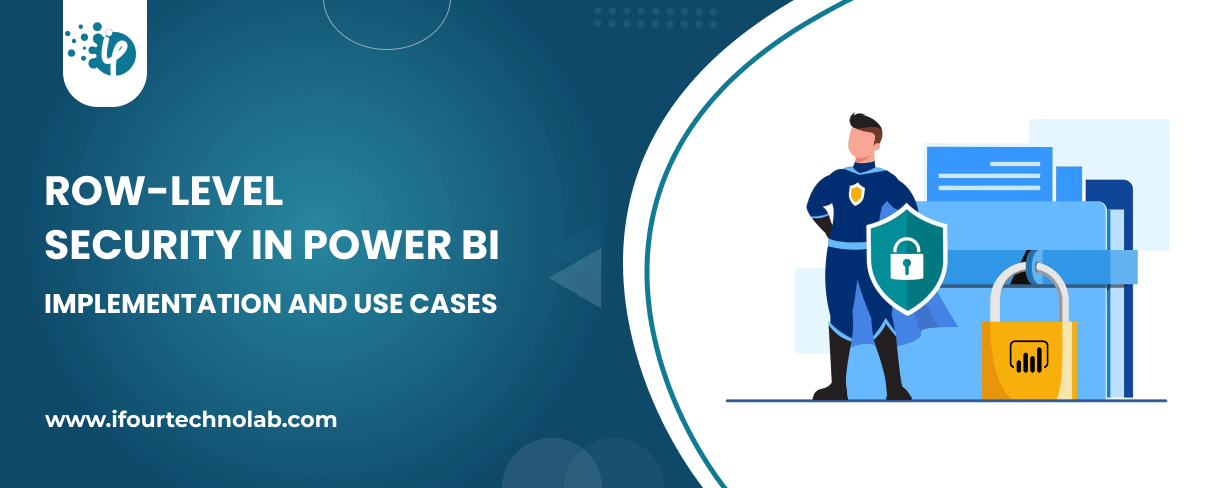Power BI Report Server: Key Features and Elements
Every CTO knows the struggle of managing complex reports. The inefficiency of scattered data, the constant juggling between reporting tools, the challenge of ensuring accurate KPIs...
Kapil Panchal - November 28, 2022
Listening is fun too.
Straighten your back and cherish with coffee - PLAY !

AR and VR have been the most promising technologies aimed at bringing tech-driven transformation to a variety of sectors. The combination offers various benefits and enables organizations to embark on the path of digitization through seamless interconnectivity and smart automation.
Virtual Reality immerses viewers in a virtual environment while Augmented Reality overlays digital visuals on real-world objects. They connect virtual and real worlds together using enhanced 3D visuals, simulation, etc., and offer an enriched user experience to the user.
In this blog, we will learn in detail about how AR and VR modernize the Legal sector.
"One way that AR and VR can help the legal sector is that they can help new lawyers feel comfortable trying cases in court.
You can run simulations in VR so a lawyer can practice in a more realistic setting, helping them better prepare for the actual courtroom. This makes new attorneys more prepared for trials, ensuring a better experience both for them and for their clients."
"The legal sector is one of the most technologically advanced sectors in the world. With the use of AR and VR, legal professionals can now create experiences that are more engaging, immersive, and interactive. Legal professionals can use AR to create a virtual environment for their clients to understand what it will be like to live in a certain country or city. They can also use VR to show how a certain law would affect someone's life. The use of these technologies by lawyers has helped them make better decisions and understand the consequences of their choices."
"Augmented reality (AR) and virtual reality (VR) are still relatively new technologies, but they are already having a profound impact on a wide range of industries."
The legal sector is no exception. AR and VR are being used in law firms across the country to improve everything from trial preparation to case management. For example, AR can be used to create virtual 3D models of crime scenes, allowing lawyers to get a better understanding of the evidence. VR, on the other hand, can be used to create realistic simulations of courtroom situations, giving lawyers the opportunity to practice their advocacy skills in a safe and controlled environment.
As AR and VR continue to evolve, it is likely that they will have an even greater impact on the legal sector.
"AR and VR can help the legal sector through reenactments. Indeed, footage (for instance with a body camera) of an incident can give an impression that turns out to be quite inaccurate when watching the complete scene (the completion of the data being a whole theme in itself, with its inaccuracies, not covered here), where needed from different angles. Thereby it is important to understand that the 1st person's POV doesn't enhance empathy, quite to the contrary: it removes the distance to the object of empathy, thereby erasing the potential energy that fuels empathy, and can give a false sense that one understands the predicament of the individual one took the position of in the (AR or) VR content, whereas one is not in the actual body of that individual, nor does one have the same experience of or is in the same position in life, thus making one's experience a chimera probably leading to wrong interpretations, be it for legal or other purposes."
"With access to a court or the site of a crime or tragedy, VR specialists can rapidly create an immersive experience that enables witnesses, jurors, attorneys, and even judges to explore the scene firsthand, completely comprehending the scenario and seeing what could or could not have occurred. Immersive experiences may assist a legal firm in preparing clients and witnesses for their upcoming court appearances. Views of the actual courtroom replicated in high-detailed virtual reality enable users to wander across the room and see their position from every aspect. When organizations use actors and/or their peers to educate more junior fee-earners, these learning days may be replaced with a Virtual Reality solution that can be replayed indefinitely for each new intake of training contracts. It is a more cost-effective, flexible, and entertaining experience that will unquestionably enhance the learning process."
"Augmented and Virtual reality is one of the leading technologies today and has been embraced by many sectors, the legal sector included. Many law firms have employed the use of AR and VR to improve client engagement and team communication. It is easier to communicate with your teams from the comfort of your home as a lawyer than to start shuffling about, getting ready, hitting the road, and trying to beat a time of appointments with your clients while trying to keep other things in order. With AR and VR, you can comfortably engage your clients deeply as well as maintain your team connection with the only criteria being to have a working internet connection; not much effort is needed, and no time wastage is needed.
Virtual courtrooms can be created for junior staff as it affords them the opportunity to try out challenging cases on their own. This could serve as some sort of practice, and we know what they say about practice; it makes perfect."
"People can use virtual and augmented reality to connect and improve their communication skills. Furthermore, any previously known device could not provide the user with an amazing and detailed experience. A few law firms have used AR and VR technology to improve client engagement and team communication. To prepare junior staff for difficult cases, virtual courtrooms can be created. VR has been used in court to place jurors in the same room as people giving depositions. Employees can practice for such events by immersing themselves in lifelike scenarios using augmented reality (AR) and virtual reality (VR) technology. Oil companies such as BP and ExxonMobil, for example, use virtual reality to train their employees in everyday work scenarios such as startup and emergency exit."
"The legal sector is one of the many that can be greatly affected by the use of AR and VR. In particular, these technologies can be used to create realistic simulations that can be used for training purposes. For example, law students can use VR to gain experience in courtrooms or shadow lawyers in their day-to-day work.
In addition, AR can be used to create interactive 3D visualizations of legal documents, making it easier for lawyers to understand complex cases. Ultimately, the use of AR and VR within the legal sector has the potential to improve the efficiency and accuracy of the justice system as a whole."
"Augmented reality (AR) and virtual reality (VR) are quickly becoming more sophisticated and widespread, with new applications and industries being explored all the time. The legal sector is no exception, with both AR and VR proving useful for a variety of purposes.
For example, AR can be used to help lawyers view 3D models of a crime scene or accident location. This can be invaluable in helping to assess evidence and plan strategy. VR can be used to simulate court proceedings, giving lawyers the opportunity to test different strategies and get an idea of how a particular case might play out in front of a judge or jury."
"Augmented Reality (AR) and Virtual Reality (VR) are technologies that are becoming more and more popular, and they have a lot of potential applications in different fields. In particular, AR and VR can be very useful in the legal sector.
One way that AR and VR can be used in the legal sector is in the courtroom. For example, a lawyer could use AR to show a jury a 3D image of the crime scene, or VR to give the jury a 360-degree view of the scene. This can help the jury understand the case better and make better decisions.
AR and VR can also be used to help lawyers prepare for cases. For example, a lawyer could use VR to walk through a virtual version of a courtroom, or AR to view a 3D model of the defendant. This can help the lawyer to understand the case better and to come up with a strategy.
AR and VR can also be used to help lawyers communicate with clients. For example, a lawyer could use VR to show a client a 3D model of the client’s case, or AR to show the client a video of the court proceedings. This can help the client understand the case better and make better decisions.
Overall, AR and VR have a lot of potential applications in the legal sector, and they can be very useful in helping lawyers prepare for cases, communicate with clients, and understand cases better."
AR and VR have caught a huge buzz for bringing tech-driven change in diverse industries. The combination brings virtual and real worlds on the same page through enhanced 3D visuals, and simulation and offers an enriched user experience to the user. With seamless interconnection and intelligent automation, they give enterprises impeccable benefits and advance them to the path of digitization. This blog has gone into great depth on the benefits of AR and VR and how they are transforming the legal industry.

Every CTO knows the struggle of managing complex reports. The inefficiency of scattered data, the constant juggling between reporting tools, the challenge of ensuring accurate KPIs...

The very first reason why you should implement Row Level Security is to foster trust, a crucial element for any business's success. Next, it reduces data clutter and helps you load...

The performance of Power BI is significantly influenced by two essential factors: design consistency and the rapid loading of BI elements. This holds true whether you choose Tableau...